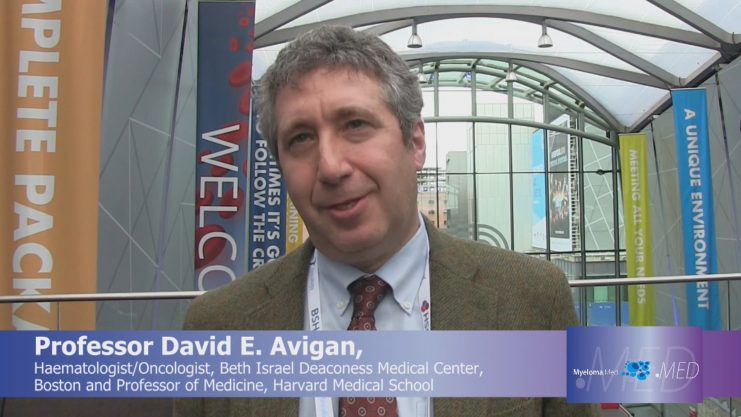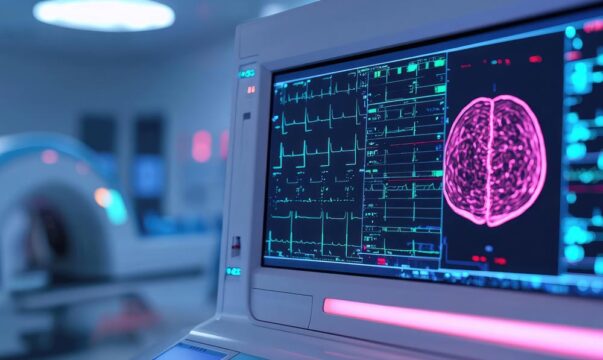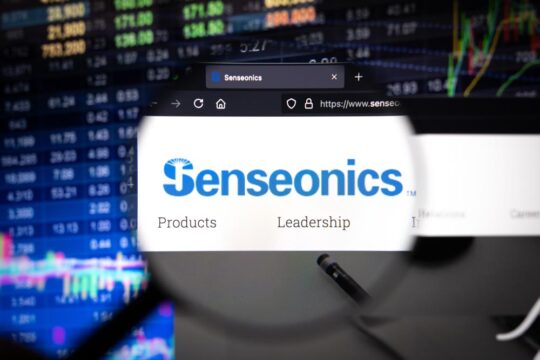Advertisment
BSH 2018: Personalised cancer vaccines and cellular therapy: changing the treatment paradigm for haematological malignancies

Dendritic cells (DC) are known to play an important role in the initiation of primary immune responses. In cancer, deficient DCs contribute to tumour-associated immune tolerance. Functionally active DCs can be grown ex vivo from peripheral blood mononuclear cells in the presence of cytokines and can be made to carry tumour antigens to stimulate an anti-tumour response…
Article by Maria Dalby. Interviews by Esther Drain.
Professor David E Avigan (Boston) and Dr Martin Kaiser (London) highlight the unique promise of immune therapy in the above video.
Novel therapies, including biological agents, have improved outcomes in multiple myeloma (MM) but for most patients the disease remains incurable – it will progress and eventually become resistant. In the concluding UK Myeloma Forum presentation, Professor David Avigan from the Beth Israel Deaconess Medical Center outlined the ongoing work by his team at Harvard Medical School to develop immunotherapeutic strategies for eradicating malignant cells and residual disease following intensive therapy and autologous stem cell transplantation (ASCT). The rationale for these efforts was the observation that allogeneic haematopoietic stem cell transplantation can cure a proportion of patients due to the graft-versus-disease effect.1-6 However, allogeneic transplantation is associated with significant morbidity and mortality due to the toxicity of the treatment regimens and the high risk of graft-versus-host disease. Professor Avigan’s work is therefore focused on achieving myeloma-specific immune responses that are tumour selective and that generate a memory to prevent recurrence.
Dendritic cells (DC) are known to play an important role in the initiation of primary immune responses.7, 8 In cancer, deficient DCs contribute to tumour-associated immune tolerance.9 Functionally active DCs can be grown ex vivo from peripheral blood mononuclear cells (PBMCs) in the presence of cytokines10, 11 and can be made to carry tumour antigens to stimulate an anti-tumour response.12-15 Professor Avigan and his team have developed a myeloma vaccine by fusing autologous DCs with myeloma cells. In a Phase 1 study 17 patients, with a mean age of 57 years and a median of four prior lines of therapy, received vaccine doses of 1 × 106 (3 patients), 2 × 106 (4 patients), and 4 × 106 fusion cells (9 patients) and achieved a 10-fold expansion of myeloma-reactive T-cells, and for the majority of patients (66%) disease stabilisation.16 A further study has explored DC/MM fusion vaccination in conjunction with autologous transplantation, based on the rationale that the transplantation will minimise the immunosuppressive effect of MM and result in a more durable response.17 In this study 35 patients received vaccine after ASCT and achieved a post-transplant increase in myeloma-specific T cells that was significantly expanded following vaccination. A total of 78% of patients achieved CR or VGPR, and 47% achieved a CR/nCR; 24% of patients who achieved PR following transplantation were upgraded to CR/nCR after vaccination, indicating a vaccine-mediated effect on residual disease.17
Professor Avigan also discusses his research into vaccines for myeloma and how these may have synergies with CAR-T cell therapies in the future.
A Phase 2 multicentre study, BMT CTN Protocol 1401, is currently evaluating DC/MM fusion vaccination in combination with lenalidomide maintenance therapy following ASCT, with survival and CR rates at one year post-transplant as the primary clinical endpoint and the expansion of treatment-induced myeloma-specific T cells as a primary immunological endpoint. Another strategy that is being explored for enhancing the efficacy of DC/MM fusion vaccination is combination with chimeric antigen receptor (CAR) T cell therapy. The rationale for this is that combining vaccination with CAR T cells will allow for vaccine-mediated activation and expansion of the CAR-T cells which will yield a broader T cell response and greater persistence. As the complex interactions between the immune system, and the tumour cells and their microenvironment become better understood, the aim is to be able to integrate therapy to not just cure MM but prevent it.
References
- Bellucci R, Wu CJ, Chiaretti S, et al. Complete response to donor lymphocyte infusion in multiple myeloma is associated with antibody responses to highly expressed antigens. Blood 2004;103:656-63.
- Bjorkstrand BB, Ljungman P, Svensson H, et al. Allogeneic bone marrow transplantation versus autologous stem cell transplantation in multiple myeloma: a retrospective case-matched study from the European Group for Blood and Marrow Transplantation. Blood 1996;88:4711-8.
- Crawley C, Iacobelli S, Bjorkstrand B, et al. Reduced-intensity conditioning for myeloma: lower nonrelapse mortality but higher relapse rates compared with myeloablative conditioning. Blood 2007;109:3588-94.
- Gahrton G, Svensson H, Cavo M, et al. Progress in allogenic bone marrow and peripheral blood stem cell transplantation for multiple myeloma: a comparison between transplants performed 1983–93 and 1994–8 at European Group for Blood and Marrow Transplantation centres. Br J Haematol 2001;113:209-16.
- Garban F, Attal M, Michallet M, et al. Prospective comparison of autologous stem cell transplantation followed by dose-reduced allograft (IFM99-03 trial) with tandem autologous stem cell transplantation (IFM99-04 trial) in high-risk de novo multiple myeloma. Blood 2006;107:3474-80.
- Bruno B, Rotta M, Patriarca F, et al. A comparison of allografting with autografting for newly diagnosed myeloma. N Engl J Med 2007;356:1110-20.
- Avigan D. Dendritic cells: development, function and potential use for cancer immunotherapy. Blood Rev 1999;13:51-64.
- Banchereau J, Steinman RM. Dendritic cells and the control of immunity. Nature 1998;392:245-52.
- Gabrilovich D. Mechanisms and functional significance of tumour-induced dendritic-cell defects. Nat Rev Immunol 2004;4:941-52.
- Szabolcs P, Moore MA, Young JW. Expansion of immunostimulatory dendritic cells among the myeloid progeny of human CD34+ bone marrow precursors cultured with c-kit ligand, granulocyte-macrophage colony-stimulating factor, and TNF-alpha. J Immunol 1995;154:5851-61.
- Romani N, Gruner S, Brang D, et al. Proliferating dendritic cell progenitors in human blood. J Exp Med 1994;180:83-93.
- Albert ML, Sauter B, Bhardwaj N. Dendritic cells acquire antigen from apoptotic cells and induce class I-restricted CTLs. Nature 1998;392:86-9.
- Boczkowski D, Nair SK, Snyder D, et al. Dendritic cells pulsed with RNA are potent antigen-presenting cells in vitro and in vivo. J Exp Med 1996;184:465-72.
- Chang AE, Redman BG, Whitfield JR, et al. A phase I trial of tumor lysate-pulsed dendritic cells in the treatment of advanced cancer. Clin Cancer Res 2002;8:1021-32.
- Geiger JD, Hutchinson RJ, Hohenkirk LF, et al. Vaccination of pediatric solid tumor patients with tumor lysate-pulsed dendritic cells can expand specific T cells and mediate tumor regression. Cancer Res 2001;61:8513-9.
- Rosenblatt J, Vasir B, Uhl L, et al. Vaccination with dendritic cell/tumor fusion cells results in cellular and humoral antitumor immune responses in patients with multiple myeloma. Blood 2011;117:393-402.
- Rosenblatt J, Avivi I, Vasir B, et al. Vaccination with dendritic cell/tumor fusions following autologous stem cell transplant induces immunologic and clinical responses in multiple myeloma patients. Clin Cancer Res 2013;19:3640-8.





